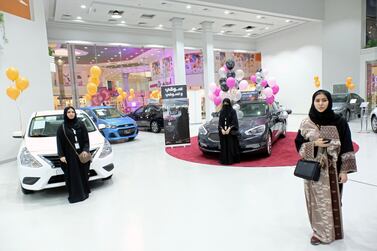Dubai luxury retailer Chalhoub Group says Saudi Arabia is its top performing market this year, driven by more women joining the workforce and earning disposable income to spend on high-end goods.
The group is opening more stores than it is closing in the kingdom to capture growth across cities as social change and government spending on new projects boost the economy, Patrick Chalhoub, chief executive of Chalhoub Group, told The National.
"Saudi Arabia is the best-performing market by far," Mr Chalhoub said. "We have this phenomenon where the women are still attended by their families but at the same time have their own income, which will make them consume. This social change by itself is influencing a lot of growth."
The company is opening 20 stores in Saudi Arabia this year to meet the growing demand.
The kingdom's decision to lift a ban on female drivers in 2018 follows a target to increase female participation in the labour force to 30 per cent by 2030 from 22 per cent , a part of Crown Prince Mohammed bin Salman's plan to wean the economy off its oil dependence. Improving women's mobility and access to jobs is expected to spur productivity, incomes and economic growth.
Saudi Arabia is a bright spot in an otherwise "flat" and "challenging" luxury retail market in the Middle East, Mr Chalhoub said. Consumption of luxury products in the Arabian Gulf slowed as a result a three-year economic slowdown sparked by low oil prices, job cuts and geopolitical tensions.
Chalhoub forecasts a slower growth rate of 2.5 per cent this year from a little more than 4 per cent in 2018. The UAE market is projected to remain "flat-ish" or "slightly down" in 2019.
Mr Chalhoub attributed the muted growth to a change in the demographic of tourists to the UAE, with fewer high-spending GCC clients and more discrimination in spending by expatriates on non-essential items.
The outlook for Dubai and the wider UAE remains "a little negative".
“When it comes to the local population, its still in growth, but not the expat who feels a bit more of the economic pressure surrounding them,” he said. “The fundamentals are good and it’s up to us to work on those fundamentals to grow our business.”
With more Chinese, Indian and African tourists, who have different purchasing power and consumption habits to GCC visitors, the business needs to adapt to capitalise on new customers, he said.
“We’re affected by the change in the mix.”
“We’re not yet as good as we should be to capture all these new customers who are coming in … We have to make sure we have the right collection, marketing and attraction for those tourists.”
Last year, India was Dubai’s top source market for inbound tourism, followed by Saudi Arabia, the UK and China, according to government data.
The company is “killing unnecessary costs”, investing in e-commerce, closing unprofitable stores while investing in viable ones and offering competitive prices amid currency fluctuations and a strengthening dollar, Mr Chalhoub said.
The company is planning to close 26 stores and open 18 in the UAE this year as part of its continual retail footprint assessment. Last year, it closed 34 stores and opened 32.
The company typically spends between 5 to 25 per cent of its sales revenue on marketing. Capital expenditure this year will remain at 2018 levels, he said, but declined to provide a dollar figure.
Mr Chalhoub said he expects signs of revival in the market late this year or in 2020, on the back of Abu Dhabi's Dh50 billion economic stimulus programme, rise in number of visitors for Expo 2020 and the UAE's push for economic diversification from oil.
The GCC's retail sector is projected to grow at an annual rate of 4 per cent to $308 billion (Dh1.1 trillion) in 2023 from $253.2bn in 2018 because of a rise in population, international tourist arrivals and improved consumer spending as economies recover, according to investment bank Alpen Capital.
Saudi Arabia is the largest retail market in the GCC, accounting for around 46.2 per cent of the total retail sales in the region. Growth is driven by a large population, creating an expanding consumer base comprised of affluent society and young and working class, said Alpen Capital.
Economic and social reforms are attracting international retailers to establish base in the kingdom. Easing tourism visa rules, growth in e-commerce and government initiatives such as allowing 100 per cent foreign ownership for retailers are helping boost the sector.
Chalhoub, a family business, has no plans for a public listing or for raising funds this year, said the company chief executive.







